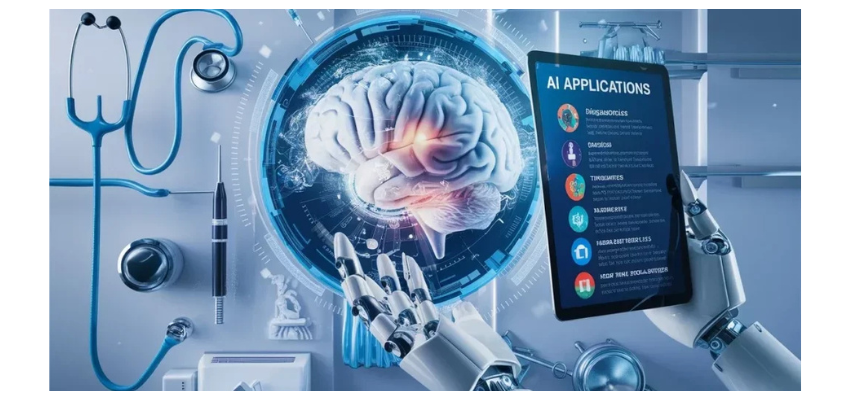The Role of AI in Modern Healthcare

AI in healthcare is transforming the landscape of medical practice, providing tools that enhance our understanding and treatment of diseases. In recent years, we have witnessed a surge in AI-driven technologies—from predictive analytics in patient diagnosis to robotic-assisted surgeries—that not only streamline processes but also elevate the quality of care provided by healthcare professionals.

Benefits of AI in Patient Diagnosis
AI has revolutionized patient diagnosis, instilling confidence in decision-making through advanced data analysis techniques. By employing AI algorithms, healthcare providers can analyze medical images, detect anomalies, and diagnose conditions faster and more accurately than traditional methods.
Improved Accuracy in Medical Imaging
AI’s ability to process and analyze imaging data quickly sets it apart from conventional diagnostic methods. For instance, deep learning algorithms can evaluate medical images such as X-rays, MRIs, and CT scans with impressive sensitivity and specificity.
These algorithms, trained on large datasets of de-identified images, learn to distinguish between healthy tissues and those affected by various pathologies. With the ability to recognize subtle changes in images that might escape even experienced radiologists, AI enhances the accuracy of diagnoses for conditions like cancers, fractures, and neurological disorders. This increased accuracy translates to better treatment decisions, reducing the likelihood of misdiagnoses and unnecessary interventions.
Predictive Analytics for Early Diagnosis
Another vital area where AI shines is in predictive analytics, allowing healthcare professionals to identify potential illnesses before they become advanced or symptomatic. By analyzing electronic health records (EHRs) and other patient data, AI tools can flag patterns that may indicate an impending health crisis.
For example, machine learning models can assess patients’ historical data, including demographics, lab results, and past medical history, to predict which individuals are at heightened risk for conditions like diabetes or cardiovascular diseases. This foresight facilitates early intervention strategies, empowering healthcare providers to implement preventive measures tailored to each patient’s unique profile.
Enhanced Decision Support Systems
Decision support systems augmented by AI play a crucial role in clinical settings. These systems analyze vast amounts of clinical data and evidence-based guidelines to assist practitioners in making informed decisions about patient care. AI can sift through mountains of research and real-world data much faster than any human could, synthesizing relevant information to generate actionable recommendations.
As a result, when a doctor faces a complex case, they can rely on AI systems to provide supportive recommendations based on similar cases, treatment protocols, and outcomes. Such assistance leads to improved patient safety, as AI can highlight potential drug interactions or contraindications that might be overlooked during busy clinical shifts.
Enhancing Patient Care with AI Technologies
Beyond diagnostics, AI technologies have made significant strides in enhancing patient care across various dimensions. The implementation of intelligent systems in hospitals and outpatient settings improves workflows, engages patients, and tailors care to individual needs. In this section, we will delve into how AI influences patient interactions, operational efficiency, and the overall healthcare experience.
Personalized Treatment Plans
One of the most transformative aspects of AI in healthcare is its ability to create personalized treatment plans based on a patient’s unique genetic makeup, lifestyle, and preferences. This level of customization allows healthcare providers to offer therapies that are specifically tailored to each individual, rather than adopting a one-size-fits-all approach.
For instance, AI-powered genomic analysis tools can evaluate a person’s genetic predisposition to certain diseases and their likely responses to various medications. Armed with this information, clinicians can select drugs and dosages that optimize therapeutic outcomes while minimizing adverse effects.
This shift towards personalized medicine is particularly advantageous in oncology, where tumor profiling can guide targeted therapies. Patients can benefit from more effective treatments that consider their specific tumor characteristics, resulting in improved survival rates and quality of life. AI stands as a powerful ally in this endeavor, enabling a deeper understanding of disease mechanisms and driving innovation in treatment modalities.
Virtual Health Assistants
AI-driven virtual health assistants are changing the way patients interact with the healthcare system. These intelligent chatbots and voice-activated assistants can provide patients with immediate responses to common questions, schedule appointments, send reminders for medication adherence, and deliver educational resources.
By utilizing natural language processing (NLP), these virtual assistants can engage patients in meaningful conversations, addressing their concerns in a conversational manner. This reduces the burden on medical staff and enhances patient experiences by offering round-the-clock support.
Moreover, virtual health assistants can monitor patients with chronic conditions, capturing symptoms and relaying vital information to healthcare providers. This continuous monitoring ensures that changes in a patient’s condition are detected early, prompting timely interventions that prevent complications and hospitalizations.
Streamlined Operations in Healthcare Facilities
The integration of AI in administrative tasks helps healthcare facilities streamline operations, reduce waste, and allocate resources more effectively. Many hospitals face challenges related to scheduling, resource management, and billing—all of which can be addressed with AI solutions.
AI algorithms can optimize appointment scheduling by analyzing factors such as patient load, clinician availability, and treatment times. This leads to reduced wait times for patients and maximizes clinician productivity. Furthermore, AI can automate administrative functions like billing and claims processing, minimizing errors and expediting payment cycles.
By alleviating the administrative burden on healthcare staff, AI allows them to focus on what truly matters—providing high-quality care to their patients. The outcome is a more efficient healthcare system where both patients and providers derive benefits from reduced inefficiencies.
Challenges and Ethical Considerations of AI in Healthcare
While the advantages of AI in healthcare are extensive, they come with challenges and ethical considerations that must be addressed. As we navigate this new frontier, it is essential to understand the implications of incorporating AI technologies into healthcare practices. This section will explore issues related to data privacy, algorithmic bias, and the necessity for regulatory frameworks.
Data Privacy and Security Concerns
As AI systems require access to vast amounts of patient data to function effectively, concerns regarding data privacy and security take center stage. Protecting sensitive health information is paramount, especially given the increasing frequency of cyberattacks targeting healthcare institutions.
Healthcare providers must ensure that AI systems comply with regulations like the Health Insurance Portability and Accountability Act (HIPAA) in the United States, which safeguards personal health information. Additionally, encryption and robust cybersecurity measures are essential to protect against data breaches that could compromise patient confidentiality.
However, the challenge lies in balancing the need for data accessibility by AI algorithms with privacy concerns. Striking this balance requires implementing stringent policies that govern how data is collected, stored, and utilized in AI applications—while still enabling researchers and care providers to glean valuable insights from patient information.
Algorithmic Bias and Its Implications
The potential for algorithmic bias poses another significant challenge in AI’s application within healthcare. AI systems learn from historical data, and if that data contains biases—whether based on race, gender, socio-economic status, or other factors—the resulting algorithms may inadvertently reinforce these disparities.
For example, if an AI model is trained predominantly on data from one demographic group, it may not perform adequately for patients outside that group. Such biases can lead to unequal access to care and treatment recommendations that are not representative of diverse populations.
To mitigate these risks, it is crucial for developers and healthcare institutions to conduct thorough evaluations of AI systems and their training datasets. Ensuring diversity in data representation and integrating fairness assessments into the algorithm development process can help create more equitable healthcare solutions.
Regulatory Frameworks for AI in Healthcare
The rapid evolution of AI technologies outpaces current regulatory frameworks, creating uncertainty around accountability and governance. Policymakers must establish guidelines that ensure the safe and ethical deployment of AI in healthcare settings.
Regulatory bodies should collaborate with technology developers, healthcare providers, and ethicists to formulate standards that address concerns related to safety, efficacy, and transparency. These standards should not only focus on the performance of AI algorithms but also account for factors such as data privacy, consent, and patient autonomy.
Additionally, ongoing education and training for healthcare professionals on the use of AI tools are essential. Clinicians need to understand the limitations of AI and how to interpret its outputs critically, ensuring that human judgment remains central in the decision-making process.
In conclusion, fostering a collaborative environment between technology companies and healthcare professionals will be essential to develop sound regulatory frameworks that promote innovation while safeguarding patient rights.
Conclusion
The integration of AI into modern healthcare represents a paradigm shift that promises to enhance patient care, improve diagnostic accuracy, and streamline operational efficiencies. While the benefits of AI are substantial, they must be pursued alongside considerations of ethics, data privacy, and algorithmic fairness.
Contact Bestarion
Get started. Pick a plan that suits your needs
At Bestarion, we understand that in today’s competitive landscape, every business needs to be agile and cost-efficient to stay ahead. That’s why we are committed to optimize our operation, so that we can offer low total cost of ownership without compromising on quality. Our team of experienced professionals works tirelessly to ensure that our solutions are tailored to your unique business needs and are delivered on time and within budget.
As a Marketing Executive at Bestarion, I oversee strategic marketing initiatives to enhance brand visibility and drive business growth. Bestarion specializes in data services and bespoke software solutions, helping businesses optimize operations with high-quality, technology-driven solutions. My role involves content creation, digital marketing, and lead generation to position Bestarion as a trusted partner in the industry.


